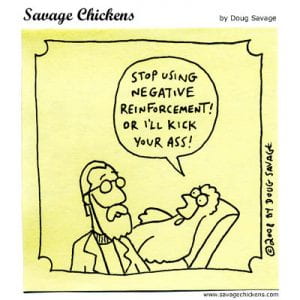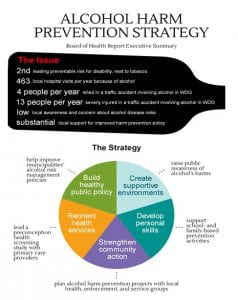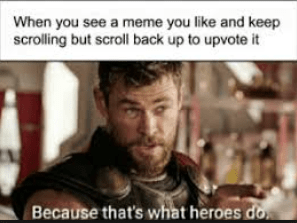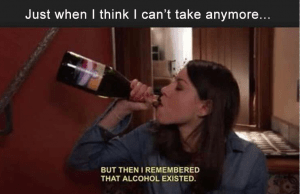To have an effective prevention strategy, you must first understand what causes people to engage in such behaviors you’d like to prevent. Knowing why people do what they do is a critical first step in creating meaningful change. As most people can personally attest to, making or breaking habits is hard work. If successful, it is often only after many false starts. To make a long-lasting change at the population level you need buy in from many; however, you must also recognize that with many people, comes many different ‘why’s’.
Consider alcohol consumption; people overindulge for many reasons. Simplistically, we can divide those reasons into two overarching concepts, positive reinforcement and negative reinforcement. It has been established men typically drink for the former, and women for the latter. Because the motivating factors for drinking differ among gender, so too should an effective prevention strategy. Targeting a campaign about alternative ways to party and celebrate without alcohol, especially regarding sporting events may be effective for men, but significantly less so for women, because that’s not why the majority of women drink or abuse alcohol.


Women drink to excess to alleviate societal pressures and undiagnosed or unregulated mental health disorders like anxiety and depression. One effective alcohol prevention strategy targeting women could start with mental health awareness. Teaching women how to recognize the signs of anxiety and depression, and then help them to identify how and where to get help would hugely reduce the onset of female alcohol misuse. If women understood the emotions they are experiencing are actually symptoms of a condition that can be treated, they may be more likely to address them with a healthcare professional, instead of thinking that’s just the hand they were dealt and cope independently and unregulated with alcohol. Education is power, and teaching women what to look out for, both for themselves and for the women in their lives around them, could stop a lot of damage before it starts.
Rob Turrisi, professor of biobehavioral health and prevention research at Pennsylvania State University, featured in Drink, has developed a handbook for effective parental interventions concerning drinking. This handbook is meant to capitalize on the concept that knowledge is power and communication is key. Young people are particularly vulnerable to alcohol misuse, because the regulatory part of their brain is has not yet reached full maturity. This means an effective prevention strategy is parents sitting down with their college bound students and preparing them for the dangers ahead. Turrisi states that this prevention strategy is more effective with young girls than young boys. Because it’s less effective for boys does not mean that the prevention strategy is not working for girls, it means that another strategy should be identified to help males.
Another important part of successful alcohol prevention is to help make people aware of what other things they may be at higher risk for when under the influence. This differs for men and women. Women are at higher risk of sexual assault, STDs, and having a child born with fetal alcohol syndrome. Men, who typically occupy higher level professional positions are more at risk for getting fired or losing status and position. They’re also more likely to be arrested for assault than women while under the influence of alcohol. Effective prevention strategies will help people make internal pro/con lists and help them evaluate if abusing alcohol is worth the potential outcomes, but first you must make it personal for them, make them feel invested, give them a reason to listen. After you’ve gotten their attention, it is important to educate them, and empower them to successfully commit to the prevention strategy.








 Similarly, another meme featuring celebrity Aubrey Plaza chugging from a wine bottle says “Just when I think I cant take it anymore… But then I remembered that alcohol existed.” Grammar aside, this makes reference to at best a tough day and at worst depression and other mental health concerns like suicide. Plaza is a comedic actor known for taking roles with dramatic substance and alcohol consumption central to the
Similarly, another meme featuring celebrity Aubrey Plaza chugging from a wine bottle says “Just when I think I cant take it anymore… But then I remembered that alcohol existed.” Grammar aside, this makes reference to at best a tough day and at worst depression and other mental health concerns like suicide. Plaza is a comedic actor known for taking roles with dramatic substance and alcohol consumption central to the  Peer pressure is another form of negative reinforcement that encourages women to drink more. This meme “I saw a husband cheering on his wife to chug her margarita at dinner….that’s the type of relationship I want.” Is scary for many reasons. When there is a mismatch of genders present when alcohol is consumed it often is more dangerous for the women than the men. While this meme clearly describes a married couple, domestic violence and sober consent are still issues at play. If you removed the ‘husband’ and ‘wife’ from this scenario it sounds like a predatory man trying to get a women drunk for potentially nefarious reasons…and the onlooker being envious of this situation. While this is likely not the case here, the meme still normalizes chugging of hard liquor and makes it sound like an ideal significant other is one who encourages you to do so.
Peer pressure is another form of negative reinforcement that encourages women to drink more. This meme “I saw a husband cheering on his wife to chug her margarita at dinner….that’s the type of relationship I want.” Is scary for many reasons. When there is a mismatch of genders present when alcohol is consumed it often is more dangerous for the women than the men. While this meme clearly describes a married couple, domestic violence and sober consent are still issues at play. If you removed the ‘husband’ and ‘wife’ from this scenario it sounds like a predatory man trying to get a women drunk for potentially nefarious reasons…and the onlooker being envious of this situation. While this is likely not the case here, the meme still normalizes chugging of hard liquor and makes it sound like an ideal significant other is one who encourages you to do so. Recently, posts by twitter users have been screenshot and turned into memes. “One time when I was drunk a guy asked me if I’d go on a date with him and I said ‘ok! But when I’m sober I’m not going to want to anymore’ and I think about that a lot.” This one delves deeper into the potentially dangerous situations women can end up in when making inebriated decisions. Dangerous or not, they are often decisions women just don’t want to be in. This author at least is self reflecting and acknowledging the difference between her sober and drunk decision making, but this example is unique in that her reflection came while drunk – not the next day when hungover wondering why the night before turned out as it did.
Recently, posts by twitter users have been screenshot and turned into memes. “One time when I was drunk a guy asked me if I’d go on a date with him and I said ‘ok! But when I’m sober I’m not going to want to anymore’ and I think about that a lot.” This one delves deeper into the potentially dangerous situations women can end up in when making inebriated decisions. Dangerous or not, they are often decisions women just don’t want to be in. This author at least is self reflecting and acknowledging the difference between her sober and drunk decision making, but this example is unique in that her reflection came while drunk – not the next day when hungover wondering why the night before turned out as it did.



